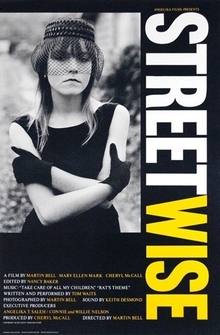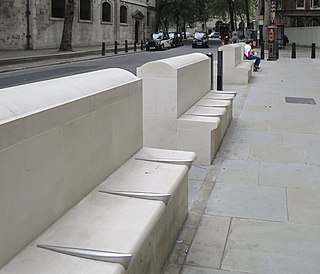Homelessness in Washington may refer to:
Homelessness in Washington may refer to:
A jungle is a dense forest in a tropical climate.

A skid row, also called skid road, is an impoverished area, typically urban, in English-speaking North America whose inhabitants are mostly poor people "on the skids". This specifically refers to people who are poor or homeless, considered disreputable, downtrodden or forgotten by society. A skid row may be anything from an impoverished urban district to a red-light district to a gathering area for people experiencing homelessness or drug addiction. In general, skid row areas are inhabited or frequented by impoverished individuals and also people who are addicted to drugs. Urban areas considered skid rows are marked by high vagrancy, dilapidated buildings, and drug dens, as well as other features of urban blight. Used figuratively, the phrase may indicate the state of a poor person's life.
A shelter is an architectural structure or natural formation providing protection from the environment
Homelessness is the condition of people without a regular dwelling.

In the United States, the number of homeless people on a given night in January 2023 was more than 650,000 according to the Department of Housing and Urban Development. Homelessness has increased in recent years, in large part due to an increasingly severe housing shortage and rising home prices in the United States.

The Seattle metropolitan area is an urban conglomeration in the U.S. state of Washington that comprises Seattle, its surrounding satellites and suburbs. Under the definition by the United States Census Bureau for the Seattle–Tacoma–Bellevue, WA metropolitan statistical area, it contains the three most populous counties in the state: King, Pierce, and Snohomish. Seattle has the 15th largest metropolitan statistical area (MSA) in the United States with a population of 4,018,762 as of the 2020 census, over half of Washington's total population.
Urchin or urcheon is the Middle English term for "hedgehog". It may refer to:
Bumvertising is a form of informal employment in which a homeless person is paid to display advertising.

Streetwise is a 1984 documentary film by director Martin Bell chronicling the lives of homeless youth on the streets of Seattle. It followed in the wake of a July 1983 Life magazine article, "Streets of the Lost", by writer Cheryl McCall and photographer Mary Ellen Mark.

Homelessness or houselessness – also known as a state of being unhoused or unsheltered – is the condition of lacking stable, safe, and functional housing. The general category includes disparate situations, including:

Discrimination against homeless people is the act of treating unhoused people or people perceived to be unhoused unfavorably. As with most types of discrimination, it can manifest in numerous forms.
Anti-homelessness may refer to:
Matt Doherty may refer to:
The AC Transit Bus fight is an American viral video depicting a physical altercation between two men aboard an AC Transit bus in Oakland, California, on February 15, 2010. The altercation was recorded by a nearby passenger, who uploaded it to video hosting website YouTube. It ranked among the top five most viewed videos on YouTube in its first week, but was not included in the official list, and has received over six million views.
National Register of Historic Places listings in Washington may refer to:
The National Union of the Homeless (NUH) is a national union of local activist organizations that fight for housing rights and economic justice in the United States. The organization was active between 1985 and 1993 and was reestablished in 2020. At its height the National Union of the Homeless had over 20 local unions and 15,000 members.
Paleontology in Washington may refer to:

The killing of Charley Leundeu Keunang, a 43-year-old Cameroonian national, occurred in Los Angeles, California, on March 1, 2015. He was shot by three Los Angeles Police Department officers.
Park Inn by Radisson, formerly Park Inn or Park Inn International, is a multi-national hotel chain that originates from the United States.

The majority of Americans (64%) own their own homes, a rate that is less than the home ownership rates other large countries such as China (90%), Russia (89%), Mexico (80%), or Brazil (73%).